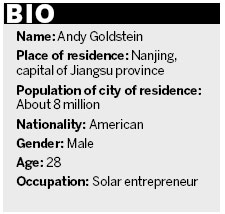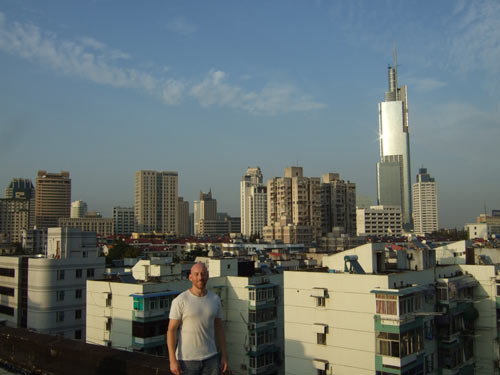Life and Leisure
Nanjing drama
By Erik Nilsson (China Daily)
Updated: 2010-09-26 08:06
 |
Large Medium Small |
|
|
Andy Goldstein believes he has a sunny future in Jiangsu's provincial capital Nanjing. The 28-year-old Texan, who has lived in the city for nearly seven years and works as SolarUS, Inc's China office chief, says Nanjing has just the right mix of "real China?and internationalism. It provides an insightful prism for observing how business is done in the country's second-tier cities. "Foreigners really want to live here because it is a China unlike that experienced by many expats in Beijing or Shanghai ?who live there because their companies sent them on assignment, and they just hang out with other expats and eat at expat bars,?he says. But while Nanjing offers more opportunities to get in touch with local life, Goldstein says it also has a cosmopolitan side.
"I would never have been able to meet foreigners from all corners of the world if I lived my life in Texas. This, of course, makes one a more worldly individual," he says.
The American has enjoyed exploring the crossroads of local and foreign ways of doing business in the city.
"I have the opportunity to interact with Chinese on a daily basis in a business setting rather than just teaching or being a student," he says.

"It has been humbling to watch the Chinese work ethic and philosophy of practicality.
"Watching the social dynamics, office politics and hierarchical interactions between Chinese subordinates and their managers, combined with the thought processes involved in decision making, are some of the most interesting things."
While Goldstein gains deeper insight into the way people outside of the primary commerce hubs do business, he believes he also brings something to the meeting table.
"I offer the city the perspectives of a Texan who is well traveled," he says.
"I provide insight to Chinese who are curious about, and want to understand, the Western social and business worlds."
Such communications are helped by the fact that Goldstein is not only fluent in Mandarin but also understands the Nanjing dialect, although his ability to speak the local vernacular is somewhat limited.
While working in the boardroom helps him understand the local business culture, Goldstein explains that it's his life outside the office that makes the city a truly fascinating place for him.
Much of his day is spent following a fairly Chinese routine, he says.
"I work out of my home for now, eat lunch in Chinese restaurants, use chopsticks, ride a bicycle everywhere and love every minute of it."
With his roughly even mix of foreign and local friends, he plays badminton, bowls and sings KTV. But most of his time hanging out with local buddies is devoted to one activity - eating.
He is particularly fond of Nanjing's supreme specialty - duck blood soup, which he enjoys chilled in the summer and hot in winter.
But while many of his days in the city are relatively routine, he says that his relationship with his girlfriend enables him to delve deeper into local life.
Goldstein says one of the most meaningful times in the city - one that has given him "insight into the inner workings of a Chinese family" - has been sharing with his sweetheart's relatives the experience of dealing with her grandfather's death.
"I [watched] my girlfriend's grandpa go from perfect health to gradually worsening and finally meeting a slow, long and agonizing death from natural causes due to the inability to afford a doctor, hospital or even hospice," he says.
The family couldn't afford to pay for healthcare or assisted living for the old man with its 4,000-yuan monthly income.
"He was confined to a wood-plank bed in my girlfriend's parents' home," he recalls.
"It was really moving to watch how this kind old man was so unfortunate and to see how beautiful my girlfriend's parents' love and dedication to him were. They cared for him the best they could."
After he passed away, Goldstein joined the family for the three-day mourning period.
He remembers that a photo of the deceased was placed on a small table with a bowl of rice into which chopsticks and incense were stuck. Fake money was burned for use in the afterlife. The door to the house was left open for 72 hours, during which time, nobody slept.
"It was a physically and emotionally exhausting experience for all, yet the Chinese are quite stoic and show little emotion," he says.
"When visitors would stop by to pay their respects, the daughter would wail and cry with the visitors. The men would yell callously - but almost as if on cue - 'Don't cry! Why are you crying?'
"This behavior would seem horribly insensitive where I am from, yet this was expected at this funeral."
Goldstein says he is grateful to have had such profound experiences in Nanjing and believes they have transformed his worldview.
"I believe living life through a Chinese lens for several years has provided me a much more worldly understanding of comparing cultures and ways of life," he says.
"It has completely changed me as a person for the better. I love China, and Nanjing will hopefully be part of my life for many years to come even if I have to leave."
